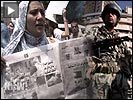
By Amy Goodman & Denis Moynihan
Journalism is not a crime. This is the rallying cry in demanding the release of four Al-Jazeera journalists imprisoned in Egypt. Three of them–Peter Greste, Mohamed Fahmy and Baher Mohamed–have just passed their hundredth day of incarceration. The fourth, Abdullah al-Shami, has been in jail for more than six months. They have been charged with “spreading lies harmful to state security and joining a terrorist organization.” Of course, the only thing they were doing was their job.
Anja Niedringhaus also was doing her job as a photographer for The Associated Press when she was murdered last week in Khost, Afghanistan. She was covering the preparations for Afghanistan’s national election, and was sitting in her car with AP reporter Kathy Gannon when an Afghan police officer opened fire, killing Niedringhaus and wounding Gannon.
Niedringhaus’ work captured the brutality of war, and the hope of humanity. She began her career as a teenager, photographing the fall of the Berlin Wall in her native Germany. She went on to work for the European Pressphoto Agency, where she covered the war in the Balkans, the aftermath of Sept. 11 in New York City, and then on to the invasion and occupation of Afghanistan. In 2002, she moved on to the AP, where she covered Iraq, Afghanistan and Pakistan, as well as major international sporting events like the World Cup and Wimbledon. When scrolling through the images of our times that she left behind, you are struck by the courage, the talent and the ability to capture and transmit an instant in time charged with the full weight of history.
Niedringhaus is one of too many journalists killed while performing a critical public service: journalism.
Russian journalist Anna Politkovskaya wrote, in 2003, “Is journalism worth dying for?” She was reporting on the attempted murder of a colleague at the fiercely independent newspaper Novaya Gazeta. She wrote: “If the price of truth is so high, perhaps we should just stop, and find a profession with less risk of ‘major unpleasantness.’ How much would society, for whose sake we are doing this work, care?” Politkovskaya answered her rhetorical question through action, by continuing to cover power in Russia, especially the presidency of Vladimir Putin. She was murdered three years later, on Oct. 7, 2006. Her killing had the hallmarks of a contract killing, as have the murders of other journalists in Russia.
Neither death nor imprisonment should be the punishment for reporting the news. The Committee to Protect Journalists compiles statistics and organizes campaigns to defend threatened journalists, free those in prison and demand accountability for journalists killed. CPJ provides direct aid for journalists facing imminent threats, including medical and legal help, and relocation. Since 1992, CPJ reports, there have been 1,054 journalists killed worldwide.










